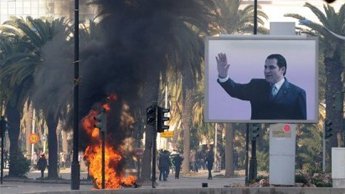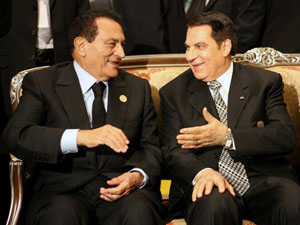Ousted Tunisian President Zine El Abidine Ben Ali is to go on trial as Riyadh opposes Tunisians’ requests to hand him over.
 Former Tunisian president Zine El Abidine Ben Ali, the first leader toppled in a wave of uprisings around the Arab world, has denied all charges against him on the eve of his trial in absentia back home.
Former Tunisian president Zine El Abidine Ben Ali, the first leader toppled in a wave of uprisings around the Arab world, has denied all charges against him on the eve of his trial in absentia back home.
Ben Ali, whose trial by a criminal court begins in Tunis on Monday, "strongly denies all charges they are trying to press as he never possessed the sums of money they claimed to have found in his office," his Beirut-based lawyer Akram Azoury said in a statement released on Sunday.
Ben Ali "hopes with all his heart that Tunisia will overcome its current chaos and darkness and continue its path to progress," he added.
| Ousted Ben-Ali and his wife. |
The former hard man, who fled to Saudi Arabia on January 14 in the face of a popular uprising against his 23-year rule, is to be tried in absentia by a criminal court over some 93 cases against his entourage.
Ben Ali could face up to 20 years in prison if found guilty of the charges, which include offences related to drugs and weapons found in a palace in Carthage.
But Monday's trial is only the beginning of a long legal process that may see top members of Ben Ali's regime in the dock over allegations that include murder, torture, money laundering and trafficking of archaeological artifacts.
Of the 93 charges Ben Ali and his inner circle now face, 35 will be referred to the military court, justice ministry spokesman Kadhem Zine El Abidine.
| The ousted presidents: Mubarak (left) and Ben Ali (right.) |
A murder or torture conviction by the military court carries the death penalty.
The head of the military justice system, Colonel Major Marwane Bouguerra, has said former interior minister Rafik Belhaj Kacem may find himself named in cases linked to 300 civilian deaths in protests between December 17 and January 14.
Investigators are now trying to establish an inventory of alleged ill-gotten gains amassed by the ousted president and his wife Leila Trabelsi, estimated by the head of a national commission as being worth about a quarter of Tunisia's gross national product.
Several European countries have frozen assets belonging to Ben Ali and his entourage.
The self-immolation in December of Mohamed Bouazizi, a 26-year-old street vendor who was complaining of unemployment, unleashed already-simmering popular anger against Ben Ali, his family and his entourage.
The uprising in Tunisia proved the inspiration for a wave of popular protest that has swept the Arab world, also toppling veteran Egyptian President Hosni Mubarak and sparking all-out conflict in neighboring Libya.


